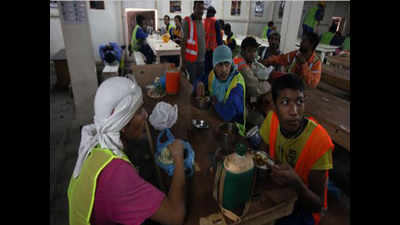- News
- City News
- bengaluru News
- Ensure decent working conditions for us, say domestic workers
Trending
This story is from June 22, 2017
Ensure decent working conditions for us, say domestic workers
Domestic workers in India, who are estimated to constitute 2 to 5.3 crore of the population, must be given basic rights and prevented from exploitation, said Right Livelihood Award winner Ruth Manorama on Wednesday.

BENGALURU: Domestic workers in India, who are estimated to constitute 2 to 5.3 crore of the population, must be given basic rights and prevented from exploitation, said Right Livelihood Award winner Ruth Manorama on Wednesday.
At a consultative workshop organized by the department of skill development, entrepreneurship and livelihood, Manorama said: “India has not ratified the International Labour Organization’s convention (No. 189) ensuring decent working conditions for domestic workers.We are not servants. Better working environment, fixed timings and social security must be provided before giving the workers additional training.”
Acknowledging that domestic workers are a fast growing workforce, Satpal Sharma, under secretary, ministry of labour and employment, said a formal work relationship between employees and employers has to be put in place.
According to Amod Kanth, chairman of the domestic workers sector skill council, India’s tradition of domestic work is an extension of slavery. “We are working towards empowering domestic workers by providing them various types of training. We have 10 levels of proficiency which they can be taken through. They will be certified as per national and international standards. We are also going to work with other stakeholders to ensure that there’s no exploitation by placement agencies. We want to give shape to a profession which is not yet recognized as one,” he said.
The workshop elicited suggestions from experts and stakeholders in building a strategy for providing upward mobility and dignified working conditions for domestic workers.
At a consultative workshop organized by the department of skill development, entrepreneurship and livelihood, Manorama said: “India has not ratified the International Labour Organization’s convention (No. 189) ensuring decent working conditions for domestic workers.We are not servants. Better working environment, fixed timings and social security must be provided before giving the workers additional training.”
Acknowledging that domestic workers are a fast growing workforce, Satpal Sharma, under secretary, ministry of labour and employment, said a formal work relationship between employees and employers has to be put in place.
According to Amod Kanth, chairman of the domestic workers sector skill council, India’s tradition of domestic work is an extension of slavery. “We are working towards empowering domestic workers by providing them various types of training. We have 10 levels of proficiency which they can be taken through. They will be certified as per national and international standards. We are also going to work with other stakeholders to ensure that there’s no exploitation by placement agencies. We want to give shape to a profession which is not yet recognized as one,” he said.
However, domestic worker union representatives argued that certification would not guarantee employment when there are greater challenges before them. “An official from the labour department recently told us that since the homes of the domestic workers do not constitute an organization, they would not get maternity benefit. If Kerala and Maharashtra can give this to their workers, why are we left behind,” asked Anita R of NGO Brothers Integrated Rural Development Society.
The workshop elicited suggestions from experts and stakeholders in building a strategy for providing upward mobility and dignified working conditions for domestic workers.
End of Article
FOLLOW US ON SOCIAL MEDIA










